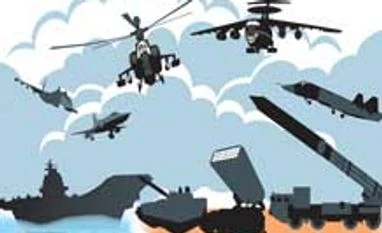“The business opportunity for the defence system for the next five years is of $150 billion. The items in which the opportunity emerges include the combat aircraft, land-based systems such as artillary and infantry and sea-based systems,” said Pillai, while addressing the 5th edition of Tamil Nadu Manufacturing Summit, organised by Confederation of Indian Industry (CII).
The figure is arrived at based on the main orders expected during the period, he said. Further, the defence procurement policy, which gives preference to the Indian manufacturers. The strategic and complex security systems has to be made only in India.
DRDO has developed products and has gone for production for Rs 1,60,000 crore. So many projects are in the completion stage and the products that are going to come out in the next five years has tremendous potential. The indigenously developed products will be manufactured only in India. Unlike the earlier years when only the research and product development was handled in India, DRDO is now product oriented.
“We have put a mandate that a minimum 30-50 per cent of the product should come from the Indian manufacturers. Another point is that even if it is imported from a foreign country, 30 per cent should be made in India out of that. Out of $150 billion, more than $100 billion opportunity is available for Indian manufacturers,” he explained. Even if the DRDO imports, it would be only for the rest of the $30-60 billion.
Besides, the companies which build the capability to supply DRDO will also get exports opportunities, such as in unmanned systems, military aircraft, land-based combat systems, communication systems, counter IED system, which can be sold across the globe.
Later, speaking to the reporters, he said that under the BrahMos, he said according to the Vision 2050, the company is planning a BrahMos mini missile, which is smaller in size and is also working on developing a hypersonic missile. There are also plans to integrate the land, sea and air systems, he added.
Speaking about the manufacturing industry in Tamil Nadu, he said that today whatever the State government is only a small portion of what it can do in the industry.
The Bharat Electricals Ltd (BEL) and Bharat Heavy Electricals Ltd (BHEL) units in Tamil Nadu has to do a lot more. He added that the BEL can work on the technologies on unmanned systems, which has a huge opportunity in the global market.
He suggested that Tamil Nadu has a potential to start titanium products manufacturing facility in India as the State has rich raw material availability and aerospace manufacturing clusters in the Southern part of the State.
Five million tonnes of titanium, a main aerospace material today, is available in Tamil Nadu. Presently a plant set in Kerala for producing 500 tonnes of sponge, but Tamil Nadu can set up 10,000 tonnes per annum facility, if they want, he said.
“Today Boeing, Airbus and all are struggling to get titanium and they are buying from Russia and many other places, but they are really struggling. So there is a great opportunity,” he added. The State can also think about manufacturing the finished product, instead of Titanium sponge, he said.
He also proposed the Government of Tamil Nadu an opportunity to set up industrial complex clusters for Aero, defence sectors. He said that an aero and defence cluster could be centred around Dharmapuri-Thoothukudi-Trichy, Naval cluster on Kattuppalli shipyard and Ennore, a small armament cluster centred around Trichy and an electronics and engineering cluster in Coimbatore.
)